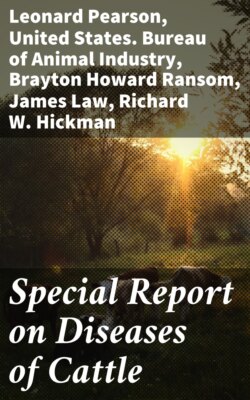Читать книгу Special Report on Diseases of Cattle - Lowe - Страница 60
На сайте Литреса книга снята с продажи.
GENERAL TREATMENT.
ОглавлениеThe treatment of animals suffering from poison must vary according to the nature of the toxic agent. There are a few general plans of action, however, which should be followed so far as possible. In man and in some of the smaller animals it is possible to eliminate unabsorbed poison by the use of the stomach pump or by causing vomiting. These proceedings are impracticable in cattle. It is well, therefore, in many cases to endeavor to expel the unabsorbed poison by emptying the digestive tract, so far as may be, with a nonirritating purge. Castor oil in doses of 1 pint to 2 quarts is adapted to this purpose. If the poison is known to be nonirritant—as a narcotic plant—from 10 to 20 drops of croton oil may be given with a quart of castor oil. When poisons are somewhat prolonged in their effect, Epsom salt in doses of 1 pound can be given advantageously. To protect the mucous membrane from the action of strong irritants, one may give flaxseed tea, barley water, the whites of eggs, milk, butter, olive oil, or fresh lard. Chemical antidotes may sometimes be used for special poisons, as advised below. In general, if an acid has been taken it may be neutralized with an alkali, such as chalk, magnesia, bicarbonate of soda (baking soda), ammonia (diluted), or soap. If the poison is an alkali, such as caustic soda or potash (lye), or ammonia, an acid, such as diluted (1 per cent) sulphuric acid or vinegar, may be administered. Special treatments and antidotes are considered below.
A poisonous agent may be so gradually introduced into the system as to slowly develop the power of resistance against its own action. In other cases where the poison is introduced slowly the poisonous action becomes accumulative, and, although there is no increase in the quantity taken, violent symptoms are suddenly developed, as if the whole amount, the consumption of which may have extended over a considerable period, had been given in one dose. Other agents, poisonous in their nature, tend to deteriorate some of the important organs, and, interfering with their natural functions, are productive of conditions of ill health which, although not necessarily fatal, are important. Such might properly be called chronic poisons. Poisons of themselves dangerous when administered in large doses are used medicinally for curative purposes, and a very large percentage of the pharmaceutical preparations used in the practice of medicine if given in excessive quantities may produce serious results. In the administration of medicines, therefore, care should be exercised not only that the animal is not poisoned by the administration of an excessive dose but that injury is not done by continued treatment with medicines the administration of which is not called for.
